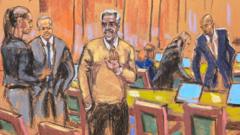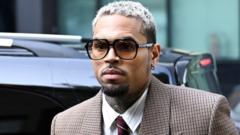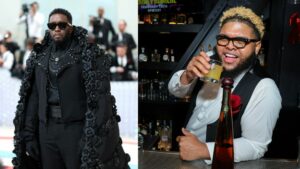In a surprising turn, Diddy's defense concluded in just 20 minutes, leaving legal experts to ponder the prosecution's strength as closing arguments approach.
Diddy Trial: Quick Defense Rests After Weeks of Prosecution Evidence

Diddy Trial: Quick Defense Rests After Weeks of Prosecution Evidence
Sean 'Diddy' Combs' attorneys make a brief case in his sex trafficking trial after extensive prosecution testimony.
Sean "Diddy" Combs' defense team concluded their arguments in his high-profile sex trafficking trial in remarkable fashion, resting their case after a mere 20 minutes of presentation. This brief interlude followed nearly seven weeks of intense scrutiny by federal prosecutors in New York, who laid out an extensive case against the rapper.
Throughout the prosecution's case, more than 30 witnesses took the stand, detailing allegations that Mr. Combs utilized his celebrity status and expansive business empire to create a criminal operation focused on sex trafficking. Diddy has firmly denied these allegations, claiming innocence against charges that include sex trafficking, racketeering, and transportation for prostitution, which could potentially land him a life sentence if convicted.
Declining to take the stand himself, Mr. Combs signaled to Judge Arun Subramanian that his decision was jointly made with his legal team. "It's my decision with my lawyers not to testify," he stated. In the brief moments he did address the court, he expressed confidence in his legal strategy and gratitude to the judge.
Defense attorneys refrained from calling any witnesses, instead opting to present text message exchanges between Mr. Combs and former girlfriends, notably singer Casandra Ventura, and another victim identified as "Jane." The quick presentation aimed to suggest that these women were willing participants in their encounters, dubbed as "freak-offs," a term they used to describe their experiences with Mr. Combs.
"During their hotel nights, I always have fun," Jane's text read, as outlined by the defense in an effort to support their argument regarding the nature of the interactions. This approach mirrors the legal team's motion for acquittal, arguing that the prosecution had not successfully established evidence meeting the required legal burden for the charges.
The defense, led by attorney Alexandra Shapiro, contended that the women involved were competent individuals who could have left their circumstances if they chose to do so. In her remarks, she downplayed allegations of sex trafficking, asserting that although Mr. Combs might have exhibited regrettable violence, it was not synonymous with sex trafficking offenses. Conversely, prosecutors have maintained that coercion through drugs, violence, and manipulation was central to the testimony provided by the alleged victims.
As the trial progresses towards closing arguments, the balance between the defense's surprisingly brief case and the prosecution's extensive evidence continues to be a focal point of discussion among legal analysts. The culmination of this high-stakes legal battle is imminent, with closing statements scheduled for later in the week.
Throughout the prosecution's case, more than 30 witnesses took the stand, detailing allegations that Mr. Combs utilized his celebrity status and expansive business empire to create a criminal operation focused on sex trafficking. Diddy has firmly denied these allegations, claiming innocence against charges that include sex trafficking, racketeering, and transportation for prostitution, which could potentially land him a life sentence if convicted.
Declining to take the stand himself, Mr. Combs signaled to Judge Arun Subramanian that his decision was jointly made with his legal team. "It's my decision with my lawyers not to testify," he stated. In the brief moments he did address the court, he expressed confidence in his legal strategy and gratitude to the judge.
Defense attorneys refrained from calling any witnesses, instead opting to present text message exchanges between Mr. Combs and former girlfriends, notably singer Casandra Ventura, and another victim identified as "Jane." The quick presentation aimed to suggest that these women were willing participants in their encounters, dubbed as "freak-offs," a term they used to describe their experiences with Mr. Combs.
"During their hotel nights, I always have fun," Jane's text read, as outlined by the defense in an effort to support their argument regarding the nature of the interactions. This approach mirrors the legal team's motion for acquittal, arguing that the prosecution had not successfully established evidence meeting the required legal burden for the charges.
The defense, led by attorney Alexandra Shapiro, contended that the women involved were competent individuals who could have left their circumstances if they chose to do so. In her remarks, she downplayed allegations of sex trafficking, asserting that although Mr. Combs might have exhibited regrettable violence, it was not synonymous with sex trafficking offenses. Conversely, prosecutors have maintained that coercion through drugs, violence, and manipulation was central to the testimony provided by the alleged victims.
As the trial progresses towards closing arguments, the balance between the defense's surprisingly brief case and the prosecution's extensive evidence continues to be a focal point of discussion among legal analysts. The culmination of this high-stakes legal battle is imminent, with closing statements scheduled for later in the week.





















